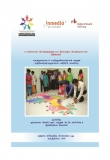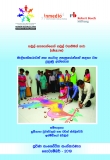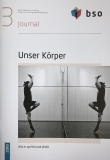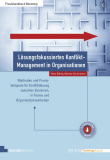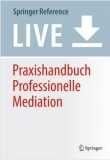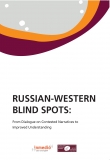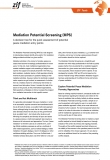Dirk Splinter
<< Zurück zu Publikationen
Konzept Friedensmediation in die außenpolitische Praxis umsetzen!
Stellungnahme der IMSD
Unterausschuss "Zivile Krisenprävention, Konfliktbearbeitung & vernetztes Handeln" Sitzung 9.3.2020 "Friedensmediation: Wie kann Deutschland seine Fähigkeiten weiter ausbauen?"
Dialogue-Faciliation Training Manual in Tamil: From shared narratives to joint responsibility (sha:re)
In the framework of our dialogue support project in Sri Lanka 2018-2020, a condensed version of the sha:re-training manual (english version) has been published in Sinhala and in Tamil in cooperation with our partners Rainbow Resources Lanka (Colombo) and the Robert Bosch Foundation.
Dialogue-Faciliation Training Manual in Sinhala: From shared narratives to joint responsibility (sha:re)
In the framework of our dialogue support project in Sri Lanka 2018-2020 a condensed version of sha:re-training manual (english version) has been published in Sinhala and in Tamil in cooperation with our partners Rainbow Resources Lanka (Colombo) and the Robert Bosch Foundation.
BSO Journal Unser Körper: Auf die Haltung kommt es an! Einsatz von Körpersprache zur Stärkung der Selbstwirksamkeitserwartung und Kreativität
Körpersprachanalyse dient häufig der Widerlegung von Unwahrheiten und beruht auf einer misstrauischen, fal-sifizierenden Grundhaltung. Wir kritisieren diesen Ansatz aus einer konstruktivistischen Perspektive und stellen eine empathiebasierte Alternative sowie dazugehörige Techniken vor, die Vertrauen aufbauen und Klienten stärken.
Lösungsfokussiertes Konflikt-Management in Organisationen
Wirkung und Nutzen von Körpersprache in der Mediation
Sensburg P. (eds) Praxishandbuch Professionelle Mediation. Springer Reference Psychologie.
Springer, Berlin, Heidelberg
Blind Spots in Russian-Western Narratives on European Security
How can we get from contested narratives on the evolution of European Security after 1989 to improved understanding within the OSCE? A Russian-German dialogue project discussed this difficult question at two workshops in Moscow and Berlin. The 20 participants managed to find consensus on a jointly drafted report. Innovatively, the project focused on so-called „blind spots”– events that figure prominently in the narrative of one side, but are overlooked or neglected in the narrative of the other side.
Russian-Western Blind Spots: From Dialogue on Contested Narratives to Improved Understanding
Results of the Dialogue Group's work in the German-Russian Project 'Russia and ‘the West’: Towards a better understanding of what went wrong since the end of the cold war: Joint Analysis of Conflict Narratives and Exploration of Metanarratives' which was funded by the Federal Foreign Office and implemented in 2018.

